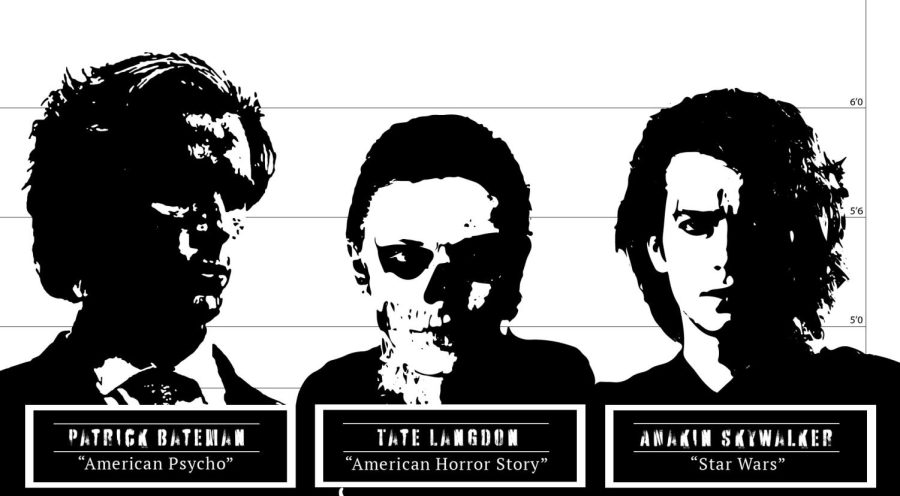The beauty and the beast
Pretty privilege pervades society
In film and television, many people ignore red flags or villainy in characters because of their looks. The Sidekick executive editor-in-chief thinks that pretty privilege tends to cause lines to blur when viewing villains.
March 27, 2023
One can argue that beauty is in the eye of the beholder, however it can be commonly agreed upon that there are certain traits that are deemed as attractive. Long eyelashes, good facial structure and clear skin appeal to the typical beauty standard.
Protagonists in films and TV shows are often portrayed as beautiful, both in appearance and morals. The young, pale rosy-cheeked and raven-haired Snow White is pitted against the greedy, self-serving wicked Queen.
Villains are easily categorized and are manipulative and violent. Notable individuals that immediately come to mind are Ursula from The Little Mermaid, the Joker from Batman and Freddy Krueger from A Nightmare on Elm Street.
From Ursula’s evil smirk to the Joker’s unnerving smile and Krueger’s scarred appearance, it can be agreed that one aspect that aligns with all of these aforementioned individuals is that the ugliness that exists within them are represented in their physical appearance as well. This mixture of inner and outer undesirability finds one constantly rooting for the protagonists in the story.
However, what happens to the public’s opinion when the villain is conventionally attractive?
Take Tate Langdon from “American Horror Story” for example. Played by Evan Peters, Langdon is initially portrayed as a deeply troubled teenage boy. As the season progresses, his true intentions and evil actions are unraveled. From murdering his own father by setting him ablaze, shooting and killing five of his classmates in a school shooting, to raping his girlfriend’s mother, his list of wrongdoings is anything but short.
However, instead of lifting up the protagonists of the story, many viewers of the show empathize with Langdon and attempt to defend his actions by citing outer influences. Scrolling through TikTok or YouTube, edits glorifying his character can be found with thousands of likes and comments.
Many viewers saw similarities between the Brianna sweater sold by Brandy Melville and one that Langdon wears in scenes from the show. The sweater was sold out, with many fans dubbing it the Tate Langdon sweater.
In the popular Netflix TV show, “Outer Banks,” one of the main antagonists is the erratic and unstable Rafe Cameron (Drew Starkey). His actions are violent and demeaning, never considering others’ emotions. He is willing to do anything to get his way, even killing an innocent police officer.
However, viewers find Starkey’s portrayal physically attractive. Scenes of Cameron’s are taken and spliced into TikTok edits. Many viewers defend his merciless actions, citing them as a result of his upbringing and family life.
Beauty Positive states, “The public likes him despite repulsive traits because he seems to be sincere, emotional and charming,”
Throughout the show, Cameron is anything but sincere. He lies, cheats and assaults his own family members and yet his actions are continuously defended.
In both these examples, viewers are more likely to excuse the villain’s actions depending on how attractive they appear. Their nefarious acts and harm they cause to others is chalked up to their surroundings, whether that be within their upbringing or due to bullies in school or work. The blame is never quite placed on the character themselves.
According to a study published by Nature Briefing,“physical attractiveness facilitates empathic responses, observing a greater empathic response to pain in more attractive people, as compared to pain in less attractive people,”
However, pretty privilege is not just an issue that exists within the fictional universes of films and television.
According to Brittanica, the Halo Effect is the tendency for physical attractiveness such as a symmetrical face to be associated with positive personality traits, although it may not be completely true. This in turn gives an advantage to those who are biologically blessed, due to the assumption of their ingenuity.
When one is deemed physically unattractive, the same actions compared to an attractive person are reacted to differently.
Instead of being described as weird, crazy or cringeworthy, a physically attractive person is eccentric, quirky or funny.
Instead of excusing villains’ actions because of their physical attractiveness, see them for who they genuinely are. Although it is difficult and subconscious, seeing past physicalities and genuinely judging individuals based upon their personality is how to overcome the societal detriments of pretty privilege.
Follow Angelina (@angelinaliiu) and @CHSCampusNews on Twitter











